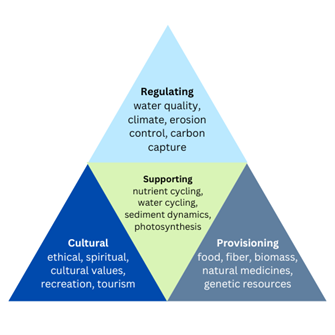Ecosystem services are described as the benefits that people obtain from the ecosystem. The living organisms in the marine environment help provide some of humanity’s most essential needs: access to clean drinking water, fresh air, clean energy, food sources and psychological benefits of being around nature. Ecosystem services arise from healthy and thriving ecosystems, and when the health of the natural world declines, so does people’s quality of life.
There are four kinds of ecosystem services and come in both tangible and intangible forms; provisioning, regulating, cultural and supporting (shown in the figure below):
Provisioning services directly provide a resource that has monetary or material value for people. In the marine environment, these are things like food sources (fisheries and sea ranching), pharmaceutical resources (seaweeds, genetic material) and drinking water. Our offshore farms are intentionally designed to boost the naturally occurring species in the surrounding waters. In a study performed on one of our installations, we found evidence of the presence of horse mackerel, a commercially important fish that is not normally found in that area! One provisioning service that we benefit from is that the sea itself cools down PV panels so they don’t get too hot, which is good for the energy yield!
Regulating ecosystem services are the processes in a healthy ecosystem that keep the system balanced and functioning. The build-up of the floating reef organisms on large-scale offshore solar farms can contribute to these services in a few ways:
- Mussel beds that develop from the growth of attached mussels act as carbon sinks, taking CO2 dissolved in seawater and burying it in the sea floor sediment.
- These mussel beds also stabilize the soft sediment sea floor and protect the area against scouring and erosion in rough conditions.
- Filter feeders (mussels, anemones and sponges) presented as marine growth on the floaters and on the seabed purify the water by filtering toxins out and improving clarity.
Cultural ecosystem services usually cannot be valued in monetary terms – they hold value for the wider needs of society like in a communal, aesthetic or spiritual sense. Including offshore solar in the marine ecosystem provides the opportunity to capture clean energy that holds societal value for all. Energy is captured and brought back to shore to serve the community in a renewable and sustainable way. And this is done out of sight, so without landscape pollution!
Supporting ecosystem services are what connects the other three categories. Healthy ecosystems support the occurrence of natural processes that keep the ecosystem healthy over time. These processes include nutrient cycling, carbon cycling and habitat formation and are key in the continued support of provisioning, regulating and cultural services. The encouragement of marine growth and the intentional, nature-friendly design of our floaters not only preserve these supporting processes but also enhance them.

